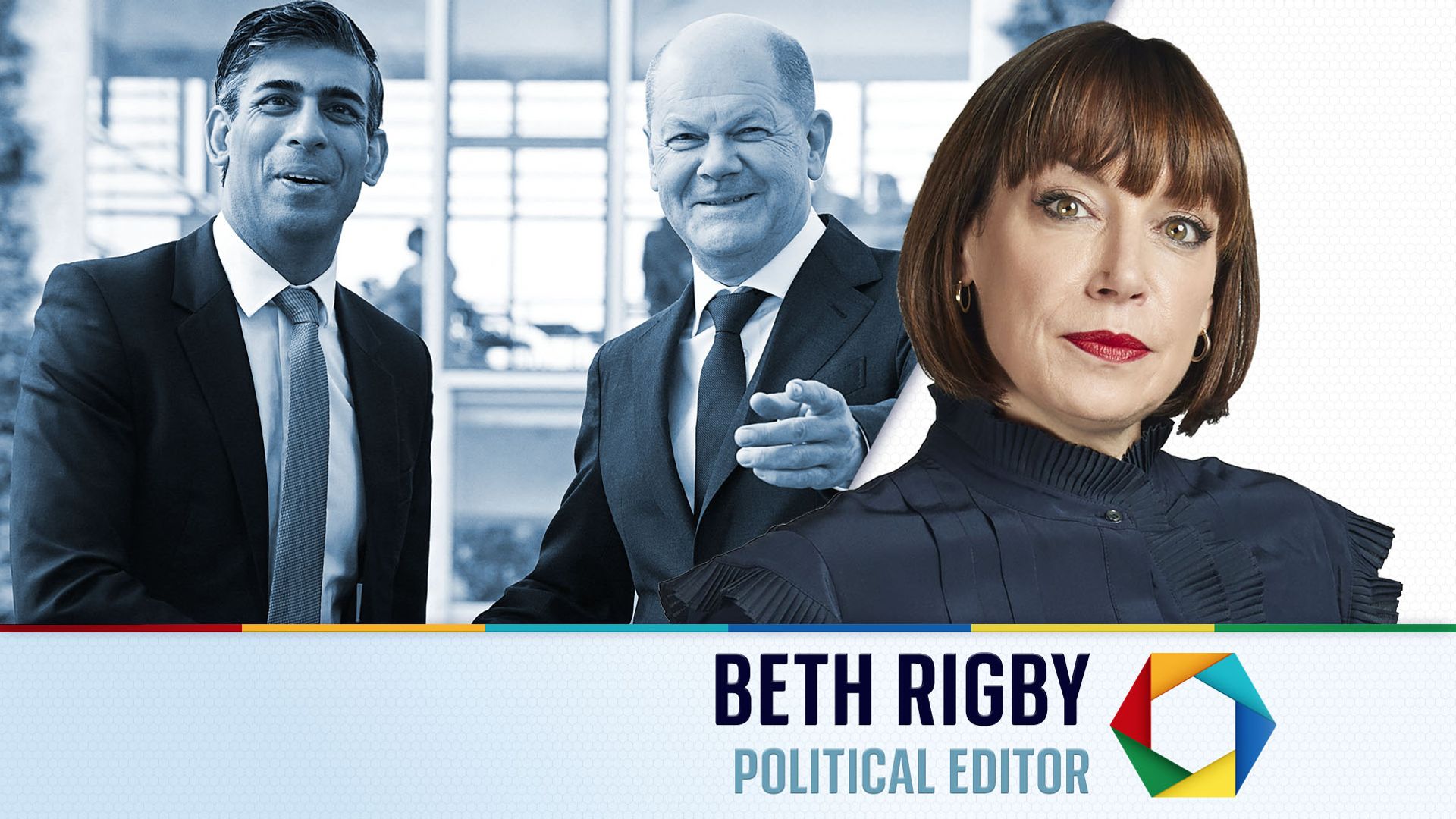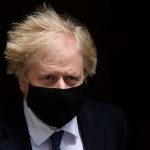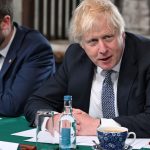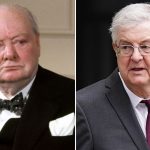This was a trip with two aims: to refocus the world’s attention on Ukraine and announce a big boost in defence spending – with an eye, of course, on national security, but also on the general election.
When it comes to Ukraine, this was a co-ordinated effort across the Atlantic.
Politics live: Rayner labels Sunak ‘pint-sized loser’
As Rishi Sunak arrived in Berlin, overnight in Washington the US was finally approving a $600m military aid package for Kyiv.
This was all designed to send a message to Russia – allies are in lockstep and will stand behind Ukraine for as long as it takes.
The prime minister used the Poland leg of the trip to commit the UK to spending 2.5% of GDP on defence by 2030, while in Berlin, Mr Sunak announced a formal bilateral security partnership with Germany to deepen co-operation on defence and military manufacturing.
It was all part of his agenda to position himself as a wartime leader, speaking of the UK’s defence industry going onto a war footing as Europe stood at a turning point.
Renters’ Reform Bill gets sign off from MPs – but indefinite delay to no-fault evictions ban remains
Rishi Sunak warns of ‘growing threats’ as he announces tens of billions of pounds in extra defence funding
UN urges UK to reconsider Rwanda plan – as minister admits legal challenges are ‘inevitable’
Keep up with all the latest news from the UK and around the world by following Sky News
“The world we are living in is increasingly dangerous and the axis of authoritarian states are working together to undermine our security,” he told his audience in Berlin.
“We need to do more. Germany has done more and we have met the NATO standard [on spending], and you see global defence spending is rising.”
Mr Sunak added: “I do believe we will look back at this moment in time and recognise this inflection point, where the old paradigm is no longer the case and we need to adjust for a new paradigm.”
And this is where the second aim of his trip came into play, to make defence spending a key election plank for the general election.
This, he argued, was all about choices, and his choice was to put the security of the country above all else.
Please use Chrome browser for a more accessible video player
There may be many who think other public services should come first. But this is the fight the prime minister wants to have as he laid down a challenge to Sir Keir Starmer
“We have made a choice and I’m not shying away from that choice,” he said. “Governing is about prioritising and I’ve decided to prioritise defence because I think that’s the right thing to do for our country.
“And I’m not going to get into writing the next manifesto here now. But what I am confident about is that if you have a strong plan for the economy, as we have, and that plan is working, and we stick to that plan, we will be able to continue increasing defence spending. It’s a completely funded plan.
“If someone is telling you that’s the wrong priority, they should explain why they think that’s the case. When it’s very clear that the international environment is changing.”
Be the first to get Breaking News
Install the Sky News app for free
For his part, the Labour leader has already said that he would also like to lift defence spending to 2.5% “as soon as resources allow”.
The prime minister’s calculation then was to show how he thinks he can find the cash and then challenge Sir Keir to either do the same or be open to accusations of not being the real party of defence.
As for the financial workings, this is how the government explains it:
To get from spending the current assumption of 2.3% of GDP on defence in 2024/5 to 2.5% in 2030/31, the government says it will need to find an additional £4.5bn of funding by 2028/9.
And it will find that money by raising £2.9bn from cutting 70,000 civil service jobs and allocating a further £1.6bn from the existing research and development budget for defence.
To hit the 2.5% target by 2030/31, another – as of yet unspecified – £2.5bn will have to be found.
But this funding hasn’t been set out, as that would fall into the next parliament and spending period.
Please use Chrome browser for a more accessible video player
One government figure tells me: “We don’t even have a spending envelope that far out, so it doesn’t really make sense to think of it in those terms.”
But it’s clear that the path to getting to the 2.5% is clearly mapped out, even if the final detail is hazy.
However, the reason Mr Sunak is trying to earmark how he hits the target is to be able to argue – as he said at today’s press conference – that his plan is “fully funded” for the next parliament.
It’s obvious that this is, in many ways, performative. He might not be the prime minister and funding forecasts may well change.
But the political point is to throw the challenge to Sir Keir – if you want to match the 2.5% commitment, how will you pay for it?
This is a debate I think the Conservatives will want to make a keystone of their election campaign, knowing all too well Labour will beat them hands down in the minds of the public when it comes to many other public services.
Where they think Starmer is weak is on national security, and they will use every opportunity to remind voters he backed Jeremy Corbyn to be prime minister, despite voters’ alarm over the former Labour leader’s approach to defence.
Be it getting the Rwanda flights or posturing as a wartime leader, Mr Sunak is at least giving himself something to try to sell.
On both counts – refocusing on Ukraine and his defence spending announcement – he will leave Berlin thinking it was a job well done.
But as he takes the win in Europe and lands back in the UK, he could soon be feeling very different as voters go to the polls in the local elections and he’s a deeply embattled prime minister once more.






















